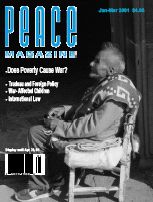
Peace Magazine Jan-Mar 2001, page 23. Some rights reserved.
Search for other articles by Johan Galtung here
Search for other articles by Dietrich Fischer here
South Korea's President Kim Dae Jung, recipient of this year's Nobel Peace Prize, has long struggled for democracy and human rights in South Korea and reconciliation with North Korea. His efforts culminated so far in the historic June 15 summit in Pyongyang with North Korean President Kim Jong Il.
This is an excellent choice, but the peace process might have been advanced even more if the prize had also been given to Kim Jong Il - it takes two to shake hands as when the prize was given not only to Sadat but to Begin, not only to Mandela but to De Klerk, etc.
In 1971, at age 45, Kim Dae Jung ran for President and almost defeated Park Chung Hee, South Korea's authoritarian ruler. Kim called for peaceful coexistence with North Korea - anathema when anti-communism was like a state religion in South Korea. He suffered gravely for his moderate stand. In 1973, he was kidnapped from a Tokyo hotel by South Korean agents and about to be dumped bound and blindfolded into the sea when the U.S. intervened to save his life.
Yet after he became President on his third attempt in 1998, he pardoned the former military rulers who had sentenced him to death. This action, resembling Nelson Mandela's, is consistent with his convictions which he expressed in a letter from prison to one of his sons 17 years earlier: "Only the truly magnanimous and strong are capable of forgiving and loving."
The first author has made over 20 visits to both North and South Korea over the last 28 years and held several dialogues with Kim Dae Jung and his advisers, twice after he was elected President. Kim's "sunshine policy" has succeeded in reducing tensions between two of the most polarized and heavily armed opponents. Key to his success seems that he has been able to put North Korea's leadership at ease that he is not trying to absorb them or subvert their system. He has been treating North Korea with respect, as an equal partner.
He did not insist on internationally supervised joint elections in North and South Korea as a first step, as an early UN resolution had called for. That approach would be unacceptable to the North Korean government, and would set the reconciliation process back many years. Common elections may be the last step in a long process, not the beginning. Instead, he focused on small, feasible steps that can bring both sides immediate and clearly visible benefits.
One such step is the agreement to reopen the rail link between Seoul and Pyongyang, which has been interrupted since the 1950-53 Korean war. It can be expanded to connect Beijing with Tokyo, with a ferry or tunnel between Pusan and Fukuoka, generating more trade and economic activity in the whole region. Such mutually beneficial projects can shift the focus away from fruitless accusations to spark people's imagination about how to create a better future for all.
Another small first step were the family reunions in Seoul and Pyongyang, although they represent only a beginning. Free travel between North and South is the ultimate goal. To succeed on this difficult path requires flexibility and caution. It is better to begin with small steps that are not seen as a threat by either side, than seeking to press for the solution of the biggest issues first, or imposing artificial deadlines.
In South Africa, Fredrik De Klerk first desegregated beaches as a small symbolic step towards ending apartheid. Later he freed Mandela and the rest is history. If he had first pushed for equal voting rights, the white minority that elected him might have removed him from office.
Jean Monnet conceived the European Coal and Steel Union as a small first step towards overcoming the century old hostility and distrust between Germany and France. It brought quick, clearly visible benefits to all members and became the foundation stone for the European Union, which has indeed made another war between Germany and France almost unthinkable.
The improvement in relations between China and the U.S. began with a Ping-Pong game, not with trying to settle the future of Taiwan.
The recent breakdown of the peace process between Israel and Palestine may be due to the premature effort to settle the future of Jerusalem, under an artificial deadline. Also, masses of unemployed Palestinian youth have not yet seen any benefits from making peace with Israel. The Korean approach suggests it is important for many ordinary people to see the advantage of peace, by creating jobs and improving living conditions.
When the North and South Korean delegations at the Sidney Olympics marched together in the opening ceremony, holding hands, the whole world applauded. There is still time to build a football stadium in the Demilitarized Zone between North and South for an all-Korean team playing in the 2002 World Cup. And the stadium would remain as an all-Korean facility, the first of many. Meeting rooms for civil society organizations from North and South, and the entire Far East, could turn the DMZ into a zone of peace. It could become the seat of an Organization for Security and Cooperation in Asia.
Much more fruitful than our usual obsession with allocating guilt is to focus on building a desirable common future.
Johan Galtung is a professor of peace studies and director of TRANSCEND, a peace &development network. Dietrich Fischer is a Professor at Pace University, Co-director of TRANSCEND.

Peace Magazine Jan-Mar 2001, page 23. Some rights reserved.
Search for other articles by Johan Galtung here
Search for other articles by Dietrich Fischer here